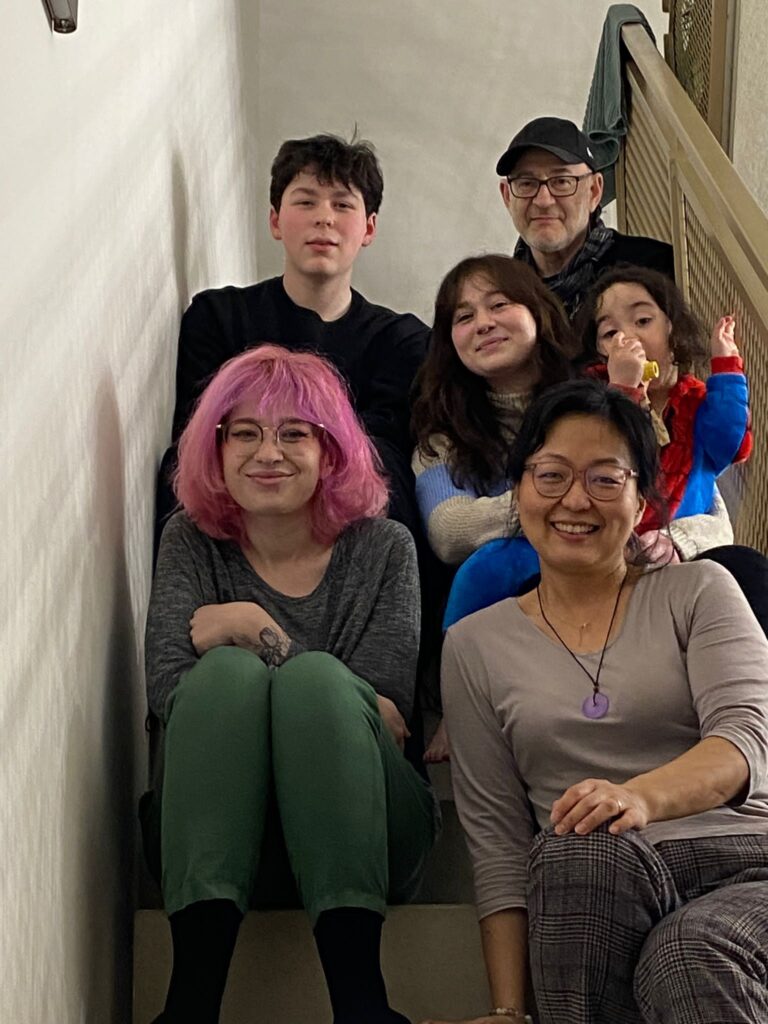
I have been married three times and have four children from my second and third marriages: Natalie called Lili, Isabella called Ella and Theodor. My first wife Nicole Schaenzler became an author and wrote a notable biography of Klaus Mann, the son of Thomas Mann. My second wife, Jennifer Hymer, is an American new music pianist whom I met in 1991 during my stay in California. We divorced in 2012. My third wife is the multimedia composer and former radio editor Xiao Fu.
I was born into a family of Hungarian refugees who had come to Germany in 1956, notwithstanding some rather sobering experiences during WWII. My father János Hajdu made a career as professor of theoretical physics at the University of Cologne, my mother Anna Hajdu née Varró, more of a francophile, gave in and later became a teacher a community college. My grandmother Katalin a native of Transylvania who used to be a pianist and teacher at the Franz-Liszt academy in Budapest and had met Hungarian greats such as Bartók, Kodaly, Ligeti or Kurtág, was an important influence, despite the fact that she was never content with my piano technique—irreparably spoiled by years of practicing the classical guitar. My father’s cousin André Hajdu studied composition in Budapest where he befriended Ligeti and Kurtág and in 1956 became a student of Milhaud and Messiaen in Paris. After years in France and Tunesia he ended up in Israel to become one of the most influential music teachers of his generation.
I my youth I used to be a goal keeper for the field hockey team of Rot-Weiss Köln. Due to fast reflexes I even made it several times into the NRW selection and also played one game in the German B-Jugend national team. With Rot-Weiss Köln I was NRW champion twice and participated once in the national championship, beaten by only one team. In my teens I was also an active mountain climber who had climbed the Snow Dome of the Barre des Écrins. By age 17, I knew that music was going to be my future, though.
It was in Cologne where I was exposed to various influences relating to contemporary music. You couldn’t escape it; the city was filled with people who had dedicated their lived to the pursuit of strange music. My piano teacher Günther Hempel had played with Karlheinz Stockhausen, whose daughter Majella I had met a party and dated a for a few weeks in 1975. My father’s secretary was an American composer named Suzanne Krebs who had studied with Ralph Shapey and Henri Pousseur and had come to Cologne to attend classes with Kagel and Stockhausen. At her parties I regularly met some of the big names of the Cologne music scene: Robert HP Platz, Kristi Becker, Clarence Barlow, Carin Levine.
Yet my first university degree was in biology, which I had chosen to satisfy my parents’ desire for stability and my curiosity for natural science. Cologne had been a center for genetic research and some of its professors were close friends of my family: Benno Müller-Hill (I beamed when his name was mentioned in my high school biology class) and Klaus Rajewsky. After a year in the lab—despite a straight A exam—I finally decided to leave biology and dedicate myself to composition—not that I hadn’t been warned about the stony and occasionally frustrating path I was about to embark on.
In 1977 I listened to an LP with music by György Ligeti which absolutely blew me away. I found out a little later that my father was acquainted with him and had met him several times over the years. My father was helpful putting me in touch with him, which then led to a visit to Hamburg in 1984. I described my encounters with Ligeti and his legacy in a chapter entitled “Von der Mövenstraße zum Ligeti Zentrum. Mein Werdegang im Spiegel eines großen Komponisten” which appeared in György Ligeti im Spiegel seiner Hamburger Kompositionsklasse: through a glass, and darkly, but face to face, edited by Manfred Stahnke, Sidney Corbett, Hubertus Dreyer, Hans Peter Reutter, Wolfgang-Andreas Schultz, and Mari Takano.